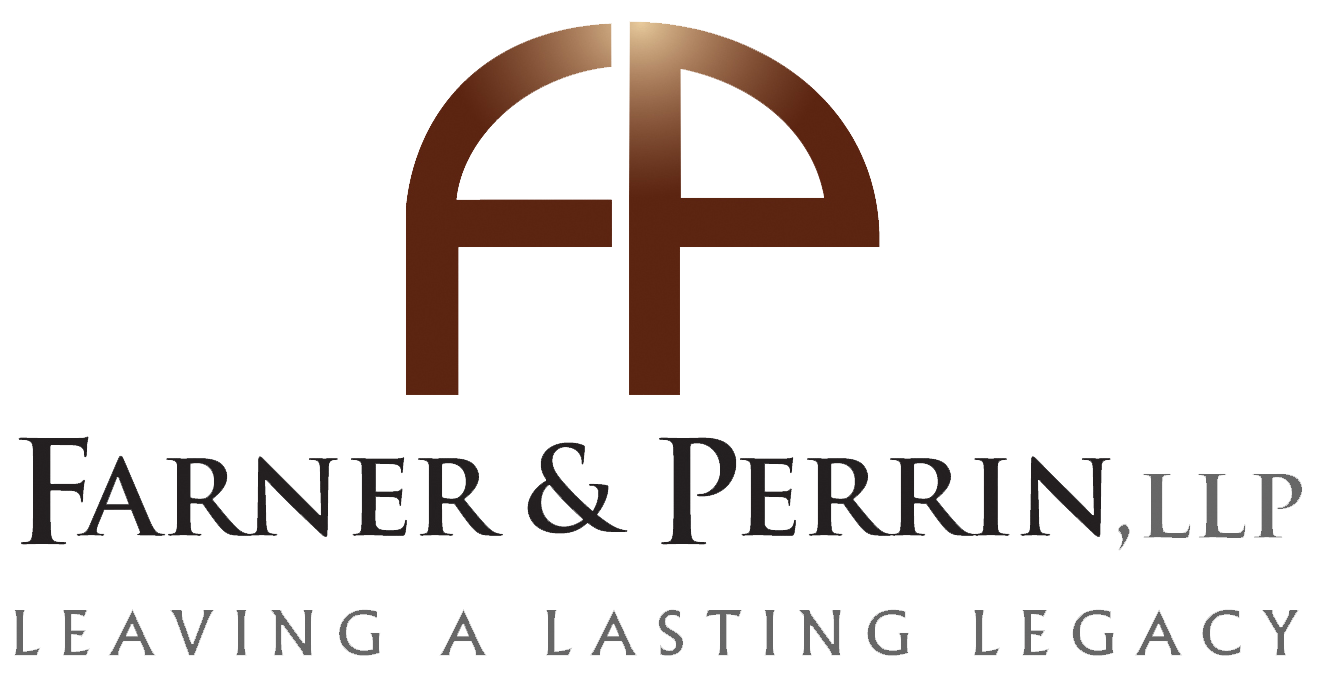Under the name Farner & Perrin, LLP, in our Firm logo, we include the byline “leaving a lasting legacy.” Obviously the idea of legacy is one which resonates with us, often overlaying all that we do. But what exactly is a legacy, and how does one leave a legacy that lasts?
Webster’s dictionary states that a legacy is “something transmitted by or received from an ancestor or predecessor from the past.” Often a legacy is expressed as a cash bequest in a Last Will, sometimes including the gift of a business, stocks or real estate as well. Assets can also be left in a trust that will benefit several generations of descendants, thereby extending the reach and impact of the person who established the trust. But does one’s legacy end with the transfer of financial assets and economic security? Having observed families now for decades, our Firm’s answer is that a “legacy” is actually much more profound.
From our perspective, legacy includes the sum total of all that you pass down to your family. No doubt, it begins with financial security and the transfer of wealth, but when done well it ends with the values, principles and sense of direction that you impart. To be sure, estate planning focuses on the wealth transfer aspect, and not so much on the transfer of values and principles. But we have noticed that as our clients mature and increasingly contemplate what they will leave behind, their focus on legacy sharpens. People yearn for a way to express themselves to their future heirs, and thus the idea of an “ethical Will” has grown in appeal.
What is an “ethical Will”? Sometimes called a “legacy letter,” this is usually a handwritten letter left for your loved ones, which tells your story. It is always personal in nature, so can include whatever items of family history, shared values, life lessons and faith foundation you would like to include. Sharing “words of wisdom,” requesting forgiveness, and expressing gratitude are also common elements of the ethical Will.
Here are a few questions to ponder:
What are you most grateful for?
What are the top three things you learned the hard way?
What tradition or value do you most want to see continue in your family?
Follow this link to additional provocative questions on our website: here.
While there is no proper format that should be followed in writing your legacy letter, having a starting point is often helpful. With that in mind, we offer this sample of what an ethical Will might look like.
Beloved Family,
By now you have received my Last Will. Prepared by a lawyer, its purpose is to dispose of the material things which I have accumulated over my lifetime and which I now no longer need. I hope its provisions will cause no ill will among those I cherish. The terms seemed sensible when I made it. But, in the end, the Will concerns itself only with material matters which are in trust to each of us only temporarily.
I am more concerned with having you inherit something that is vastly more important. Over the years, I have come to cherish a number of principles, values, and standards that have served me well. I am writing this letter to recommend these principles to you. I hope you will live justly, be productive, and use moderation and prudence as your guides, with more focus on the long-term than on immediate gratification. As far as it is within your power, use what I have left you to enrich the lives of those around you, not only your family but also those charitable causes that are important to you. Live together in harmony, forgive quickly, and help each other without being asked. When no one is looking, undertake both large and small acts of kindness.
I have loved each of you immeasurably and am grateful for the life that we have shared. I could not be more proud of who you have each become.
In fact, your legacy letter need not be left to be read with your Last Will, but could be shared at important life transitions, milestone events or even family holidays. Imagine the communication that an ethical Will could facilitate among your loved ones, while you are still here to discuss further the ideas expressed in your letter.
In the end, it is your legacy to write. Write it well.
